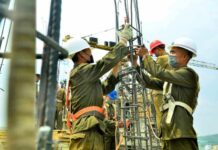
As North Korean authorities intensify their crackdowns on foreign currency transactions to encourage people to change money through official agencies, moneychangers are increasingly operating on the sly to avoid getting in trouble, Daily NK has learned.
Speaking on condition of anonymity for security reasons, a source in South Pyongan Province told Daily NK on Nov. 7 moneychangers who used to ply their trade in markets in major cities like Pyongyang, Pyongsong, Sariwon, and Sinuiju have been lying low recently. They are taking calls only from people they have dealt with before and secretly conducting deals in places other than the markets.
The source said that North Korean authorities have long banned foreign currency transactions through private moneychangers, so these individuals have already had to avoid being caught by officials. However, as government crackdowns have increased recently, moneychangers are working even deeper in the shadows.
Meanwhile, regional commercial banks are changing dollars and yuan at slightly better rates than those found in markets, not at the official rate.
For example, if the market rate for USD 1 is KPW 8,300 and KPW 1,200 for RMB 1, banks offer KPW 8,330 for USD 1 and KPW 1,220 for RMB 1.
Daily NK reported in September that North Korean banks were offering better exchange rates than private moneychangers to encourage the general public to change their foreign currency with them instead.
As a result, North Korean banks have implemented a policy of buying foreign currency at market rates over the past two months. However, the banks are not selling dollars or yuan to private individuals; instead, they are only buying foreign currency as part of broader government efforts to collect foreign currency possessed by ordinary people.
Moreover, the North Korean authorities are intensifying crackdowns on private transactions involving foreign currency. What this means in practice is that consumers can use foreign currency to buy products at official foreign currency shops or department stores, but they are restricted from paying private merchants in dollars.
All of these policies and restrictions appear aimed at bringing the foreign exchange market under the direct control of the government and to soak up the public’s foreign currency with a view to shore up the country’s insufficient foreign exchange reserves.
However, recently implemented government controls on foreign currency seem to be driving up market exchange rates.
In November, the dollar has trading at a three-year high in North Korea’s markets. According to Daily NK’s regular survey of market prices, the dollar was trading at KPW 8,500 in one market in Pyongyang as of Oct. 30, while the dollar climbed to KPW 8,600 in Sinuiju as of mid-October.
Amid government efforts to absorb foreign currency in the hands of ordinary people, North Korea’s citizens are limited to purchasing foreign currency from private moneychangers, which appears to be an factor in the increase of market exchange rates.
Translated by David Black. Edited by Robert Lauler.
Daily NK works with a network of sources who live inside North Korea, China and elsewhere. Their identities remain anonymous due to security concerns. More information about Daily NK’s reporting partner network and information gathering activities can be found on our FAQ page here.
Please direct any comments or questions about this article to dailynkenglish@uni-media.net.

















